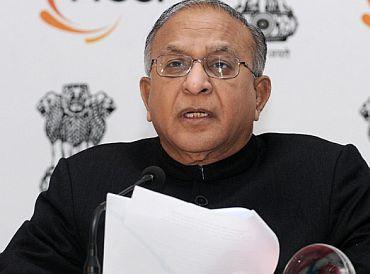 S Jaipal Reddy's efforts to take on Mukesh Ambani's Reliance group needs to be applauded, feels Sheela Bhatt.
S Jaipal Reddy's efforts to take on Mukesh Ambani's Reliance group needs to be applauded, feels Sheela Bhatt.'What will you do if you are in my seat? How can I give you such a high price for gas?' Sudini Jaipal Reddy, then India's petroleum and natural gas minister, asked Reliance Industries Chairman Mukesh Ambani during a meeting when the businessman sought a higher price for gas Reliance produced in the Krishna-Godavari basin in Andhra Pradesh.
Reddy stood his ground and did not budge an inch after half-a-dozen one-on-one meetings with Ambani, India's most powerful businessman.
When he took over the petroleum ministry in January 2011, it was a surprise for many to see the erudite Reddy in the hot seat. It could be best explained as an accident that occurs when a Cabinet reshuffle takes place.
Reddy is known for his integrity and in over 40 years in public life the Andhra Pradesh politican has never been accused of abusing power.
Reddy joined the Congress party in 1965. He became a member of the AP legislative assembly in 1969 and revolted against then prime minister Indira Gandhi when she imposed a state of Emergency and joined the Janata Party in 1977.
He unsuccessfully contested the 1980 Lok Sabha election against Indira Gandhi from Medak, Andhra Pradesh, and spoke against the dynastic politics practised by the Nehru-Gandhi family before he rejoined the Congress party.
Reddy is perceptive, but Congress leaders do not often take his advice. He is not close to either Congress President Sonia Gandhi or Prime Minister Manmohan Singh; his transparent politics make him an unlikely receipient of information about Congress intra-party intrigue.
It is strange that the battle Jaipal Reddy waged with Mukesh Ambani and Anil Agarwal, chairman of the London-based mining-to-oil conglomerate Vedanta, to save the exchequer billions of rupees is of "no political use" to the Congress which is currently sinking under the weight of corruption charges against the party.
Jaipal Reddy is an emotional man and his fondness for Sonia Gandhi averted a rebellion this week after he was moved from the petroleum ministry to the almost inconsequential science and technology ministry. He can contextualise the contemporary political situation with history as its backdrop and has the intellectual ability to see the writing on the wall.
Reddy dared to question Reliance -- disregarding its alleged intimidating influence on this government -- for slowing down the production of gas from the Krishna basin. He questioned Reliance's capital expenditure account. He insisted on better governmental supervision over the Krishna basin production records and expenditure.
Reliance had reduced its output from the 53, 54 million metric standard cubic metres of gas a day in March 2010 to around 27.5 mmscmd in 2011. Neither Reddy nor petroleum ministry officials accepted the company's reasons for this cut in production.
The petroleum ministry noted in writing that India lost Rs 20,000 crore (Rs 200 billion) due to this reduced production of gas in 2011-2012.
In 2012-2013, the reduced production led to a loss of Rs 45,000 crore (Rs 450 billion) to the exchequer. The loss increased because the actual production was less than half the projected production.
A government source, privy to information about the Reliance-petroleum ministry face-off, reveals that when Prime Minister Manmohan
v_arti_inline_advt">









